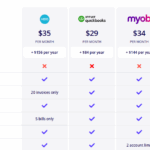
We’ve previously discussed sole traders and partnerships in our four part series on the most commonly used business structures in Australia — 1) sole trader, 2) partnerships, companies and 3) trusts— to help you decide what business structure is right for you. In this post, we discuss companies.
We also cover business structures in the Establish Legal Risk and Management module of our Small Business Management Course, which also discusses the implications each of the four different structures can have on how you borrow money, and even how much tax you pay.
Companies
By law, a company is a distinct legal entity separate from its shareholders or officers. In Australia there are two common types of companies:
- Public companies are usually formed to raise or borrow public money by listing the company’s shares for trading on the stock exchange.
- Proprietary limited companies cannot raise money from the general public through share issues.
All companies are governed by the Australian Securities and Investments Commission, which administers the Corporations Act (Commonwealth) 2001 and other legislation. Public companies must also comply with the rules of the Australian Stock Exchange.
A company is a more complex business structure, and usually the set-up and administrative costs for a company are higher than for other business structures.
Advantages
- A company has far greater access to capital for the running of the business.
- Legal arrangements are in the company’s name — not in the name of it directors and managers.
- A company pays tax on its own profits.
- The company can trade anywhere in Australia.
- The business structure ensures continuity of management and ownership even in event of the death or disability of key people — company shares can be transferred.
- The tax rate for companies is less than the highest rate for individuals.
- Shareholders are not liable for the debts of the business.
- Increased asset protection.
Things To Consider
- Companies are more expensive to establish.
- Companies are more heavily regulated than other business structures.
- The rules for establishing and operating a company are more complex than other business structures.
- The tax reporting requirements for companies are far greater than for sole traders and partnerships.
- Shareholders have little say in the running of the business.
Reporting and Paying Income Tax
- Your company must lodge an annual company tax return to report its income and deductions and the income tax it’s liable to pay.
- A company pays tax on its net profit at a flat rate of 30 percent, which may be an advantage for business with high profit levels.
- If you receive wages or directors fees from your company you need to:
- Include them in your individual tax return.
- Pay tax on them at the individuals tax rates.
Paying Superannuation
- Your company must make superannuation contributions for any eligible workers it employs, including you as company director.
***
You should consider operating your business as a company if your business is likely to need access to start-up capital, or you would prefer the increased asset protection that a company can offer.
This information is only offered as a guide and, of course, you should consult an accountant, tax professional, solicitor or business advisor before deciding which business structure to use.
Our next post in the Business Structures Explained series is: Trusts.




















